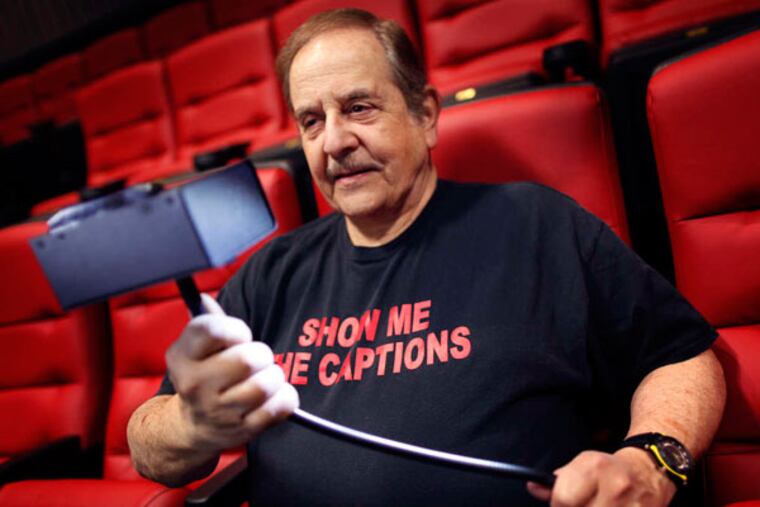At the movies, caption devices help the hearing-impaired
Alan Kutner was always the guy in the movie theater who leaned over to the person next to him and whispered "Huh?" or "What'd he say?"

Alan Kutner was always the guy in the movie theater who leaned over to the person next to him and whispered "Huh?" or "What'd he say?"
He is no longer that guy.
No one else need be, either, now that most area theaters offer small devices that discreetly display captions to the individual moviegoer.
Some theaters offer eyeglasses that display captions across the bottom of the inside surface of the lens, so that only the wearer can see them. Others provide little screens mounted on the end of flexible arms that are positioned in the moviegoer's cupholder.
Without captions, "I was only aware of the gross plot," said Kutner, 76, of Havertown.
What's more, theaters that buy the technology often acquire audio headsets for the blind as well. The wearer hears an audio track that includes both the regular movie dialogue as well as the voice of a narrator who describes the action on the screen. But many movies are not yet equipped with this narrative track, and a small percentage of films also do not have captions.
Advocates for the visually or hearing-impaired have pushed for years for these technologies, among them Kutner, who chaired a caption committee for the Pennsylvania office of the Hearing Loss Association of America. State and federal governments also have pressured theaters through litigation and proposed regulations.
But what really broke the logjam was the recent shift from traditional film projectors to digital projection systems.
The new projectors are expensive, at $100,000 apiece, but once purchased, the caption and narration technologies can be readily added on for $5,000 to $10,000, industry officials said.
Both caption devices and narration headsets are now available at all local Regal Cinemas, United Artists Theaters, and AMC Theaters. Smaller nonprofit theaters have been slower to add these services, generally because it takes time to raise money for the digital projectors.
Bryn Mawr Film Institute has installed both caption and narration technologies for all four of its screens, as have the Ritz theaters in the city.
The movie theaters in Ambler, Doylestown, and Jenkintown plan to install them as well, said Chris Collier, associate director of Renew Theaters, which manages all three. The goal is to install the system at the Ambler Theater by late summer, with the other two - County Theater and the Hiway Theater - to follow at some point after.
The caption devices are not perfect. At a showing of American Hustle last month at AMC 309 Cinema 9 in North Wales, the system occasionally skipped a few lines of dialogue.
Another problem, albeit an infrequent one, is accuracy of dialogue.
For example in American Hustle, when the FBI agent posing as a sheikh seeks a quickie U.S. citizenship, one of the characters remarks that this would require an "act of Congress."
On the caption device, however, the words read "active Congress."
Still, Kutner raves about the technology.
A retired attorney, Kutner wears hearing aids and does very well in normal conversation. But as anyone with hearing loss can attest, theaters are another story.
Actors sometimes mumble, or they face away from the audience, making it impossible to read their lips.
At the Bryn Mawr Film Institute this month, Kutner demonstrated a caption device made by California-based USL Inc., adjusting the small screen so he could see the words while watching an excerpt of The Grand Budapest Hotel. The captions were transmitted to his device by infrared signal.
Kutner estimates that he goes to the movies two or three times a month, always using a caption device.
"People say to me, 'What is that?' " he said.
The audio headsets for the blind also are a huge help, said George Holliday, director of the Wills Eye Resource Center for the Visually Impaired.
Holliday is blind, and he calls theaters ahead of time to make sure the headset batteries are charged.
The narration, also called audio description, is skillfully recorded in the gaps between the actors' dialogue and other sounds in the movie. The narrator describes such things as the physical activity of the actors, such as whether they are driving a car, throwing a punch, or even smiling or frowning.
"People might not think that's much, but that's a lot when you can't see it," Holliday said.
There remains one issue that no technology can overcome: personal taste.
Now that Kutner can read every word of dialogue in a movie, he has a better realization that director Wes Anderson is not his cup of tea.
"It's very strange," Kutner said of The Grand Budapest Hotel. "You have to like this guy."
215-854-2430